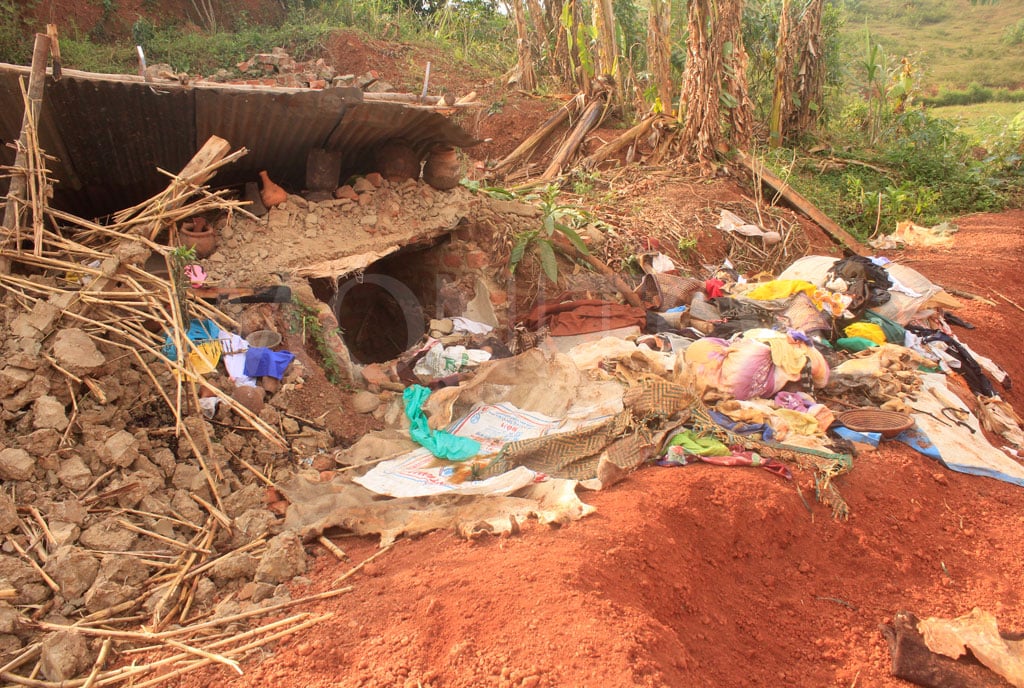Prime
Skulls mystery: Mpigi crime scene abandoned amid excavation challenge

A cave like hole is seen at the scene of crime where 17 human skulls were retrieved by police on July 28, 2024. PHOTO/BRIAN ADAMS KESIIME
What you need to know:
- Local leaders worry that intruders could destroy evidence upon accessing the crime scene.
Detectives deployed to guard the crime scene at Kabanga Village, Mpigi Town Council where 17 human skulls were recovered over the weekend, have abandoned the site amid challenges of finding a stronger excavator to plough through the earth in hope of digging up more human remains.
A visit to the site on Friday revealed that no single detective or officers were still in the area as it was the case in the previous days.
Bashir Ssemanda, the Kabanga Village defense secretary, expressed fear that police's laxity may give room to intruders to tamper with the scene of crime.
"Our worry is that people might tamper with the scene of crime and destroy evidence we believe are crucial in the ongoing investigations," he said in an interview on Friday.
However, Katonga Regional police spokesperson Majid Karim defended their decision saying even though their team of detectives is not visible at the site, a joint security team keeps a 24-hour presence in the area.
"We are confident that no one can tamper with the scene of crime because we still have interest in that site and our security team which has an army detach on the same the hill is monitoring whatever is taking place there, " Karim added.

One of the metallic suitcase where some of the human skulls were recovered on July 28, 2024. PHOTO | BRIAN ADAMS KESIIME
Hassan Kasibante, the Mpigi deputy Resident District Commissioner (RDC) said efforts are still underway to secure an excavator that can reach the site and plough through the earth to see whether there are still more craniums underneath.
On Tuesday police and political leaders in Mpigi District said they will conduct DNA tests on the recovered human skulls .They hope expert analysis on the craniums will help decode the age and gender of the deceased- and possibly when the people died.
A Deoxyribonucleic Acid, or DNA, is the hereditary material in living organisms, including humans, according to a definition gleaned on the website of the United States National Library of Medicine.
The test, among others, helps establish relations through gene matching.
“We still suspect that there could be more craniums underneath and we cannot take others (craniums) already in our possession for DNA unless we are sure that we have not left behind any exhibit,” Karim explained
The head bones were discovered in four metallic cases first sighted on Sunday by teenagers fetching firewood in a bushy abandoned shrine of one Tabula Lujja, a resident wanted by police over the killing of Ndiga Clan leader Daniel Bbosa.

Police officers gather at the cave-like hole at Kabanga Village, Mpigi District where four metallic suitcases full of human skulls were recovered by police on July 28, 2024. PHOTO | BRIAN A KESIIME
Lujja, a contender for the seat of Ndiga clan head, vanished shortly after unknown assailants shot Bbosa dead in the Kampala suburb of Lungujja on February 25.
On Tuesday, volunteers tried using pickaxes, hoes and spades to open the hard, clay-type earth, abandoning the exercise when searing temperatures connived with hunger to enervate them.
Police say they are still investigating how the skulls ended up at the shrine on Kulumba Hill and whether they were there before Mr Lujja departed the place or were brought afterwards. No arrests had been made by Friday morning.



